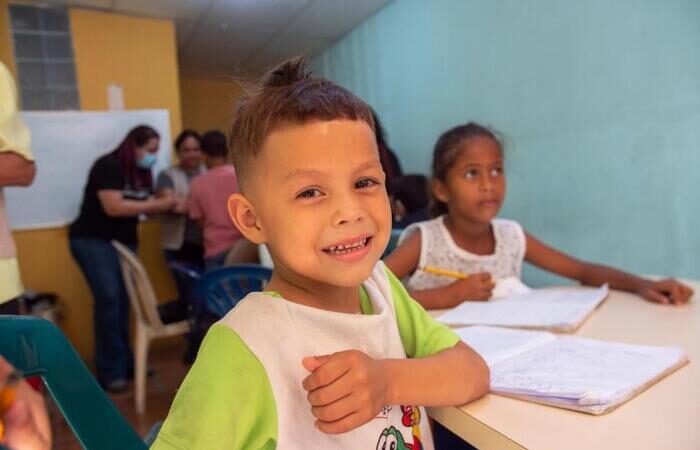EU humanitarian aid contributes €10.7 million to UNICEF to support migrant children and strengthen disaster preparedness in Latin America and the Caribbean – Colombia

The vital funds will contribute to a sustainable humanitarian response for highly vulnerable populations, including migrant and refugee children, communities affected by violence and those affected by disasters
Panama City, Panama. 21 July 2023 – Driven by protracted political and socio-economic crises, intensifying violence, and natural hazards, Latin America and the Caribbean faces one of the world’s largest and most complex child migration crises. In the region, around one in four people on the move is a child. Many countries are places of origin, transit and destination all at the same time. In response to increasing migration and disasters, the European Union, through its Civil Protection and Humanitarian Aid Operations department (ECHO), contributed a total of €10.7 million to support UNICEF’s efforts to provide relief to the most vulnerable migrant and refugee children and strengthen disaster preparedness in target countries.
The EU contribution will enable UNICEF to boost actions to guarantee the rights of children and their families affected by the crises. UNICEF’s comprehensive response for vulnerable communities includes mental health and psychosocial support, learning spaces, healthcare facilities and protection centres that will reach over 472,000 people, including 318,000 children in seven countries of Latin America and the Caribbean, namely Brazil, Colombia, Dominican Republic, Ecuador, Peru, Trinidad & Tobago and Venezuela.
In Central America, EU Humanitarian Aid supports UNICEF to strengthen the resilience of protection and education services for over 101,000 people, including 57,000 children and adolescents in El Salvador, Guatemala, Honduras, Nicaragua and Panama.
In the Caribbean, with the European Union’s support, UNICEF will help enhance the shock-responsiveness of social service systems, and strengthening disaster preparedness, in vulnerable Caribbean communities to provide over 234,000 people, including 70,000 children access to safe drinking water, nutrition, health and education.
“Thousands of children and families are leaving their homes due to multiple protracted crises, including violence, food insecurity, poverty, limited access to quality essential services, and climate hazards. This funding will help UNICEF deliver lifesaving assistance to the most vulnerable children and families, ensuring they have access to basic services throughout their migration journey and in host communities.”
-Garry Conille, UNICEF Regional Director for Latin America and the Caribbean.
“Along the migration routes of Latin America, people suffer all kinds of abuse: trafficking, sexual exploitation, armed robbery, kidnapping and even murder. Migration routes have turned into a humanitarian and protection crisis. In this harsh universe of trauma and sacrifice, children are the ones who, more than anyone else, pay the bill and live through experiences that no one should have to live through, which risk leaving indelible scars,” says Álvaro De Vicente, Head of the EU Humanitarian Aid and Civil Protection regional office for Latin America and The Caribbean. “Our work with UNICEF aims at focusing on the needs of children on the move, providing them with safe spaces and psychological support to help heal the traumas and it will continue for as long as it takes.”
UNICEF and the European Union continue working together to protect and promote children’s rights in Latin America and the Caribbean and deliver life-changing programmes for the most vulnerable families in the region.
###
Media contacts
Sendai Zea
Communication Specialist (Emergencies)
UNICEF Latin America and the Caribbean
Tel: +507 6821 0843
Email: sczea@unicef.org
Daniele Pagani
Oficial Regional de Información para América Latina y el Caribe
Dirección General de Protección Civil y Ayuda Humanitaria (ECHO, por sus siglas en inglés)
Tel: +507 6330-9572
Tel: +91 98117 82206
Email: daniele.pagani@echofield.eu






